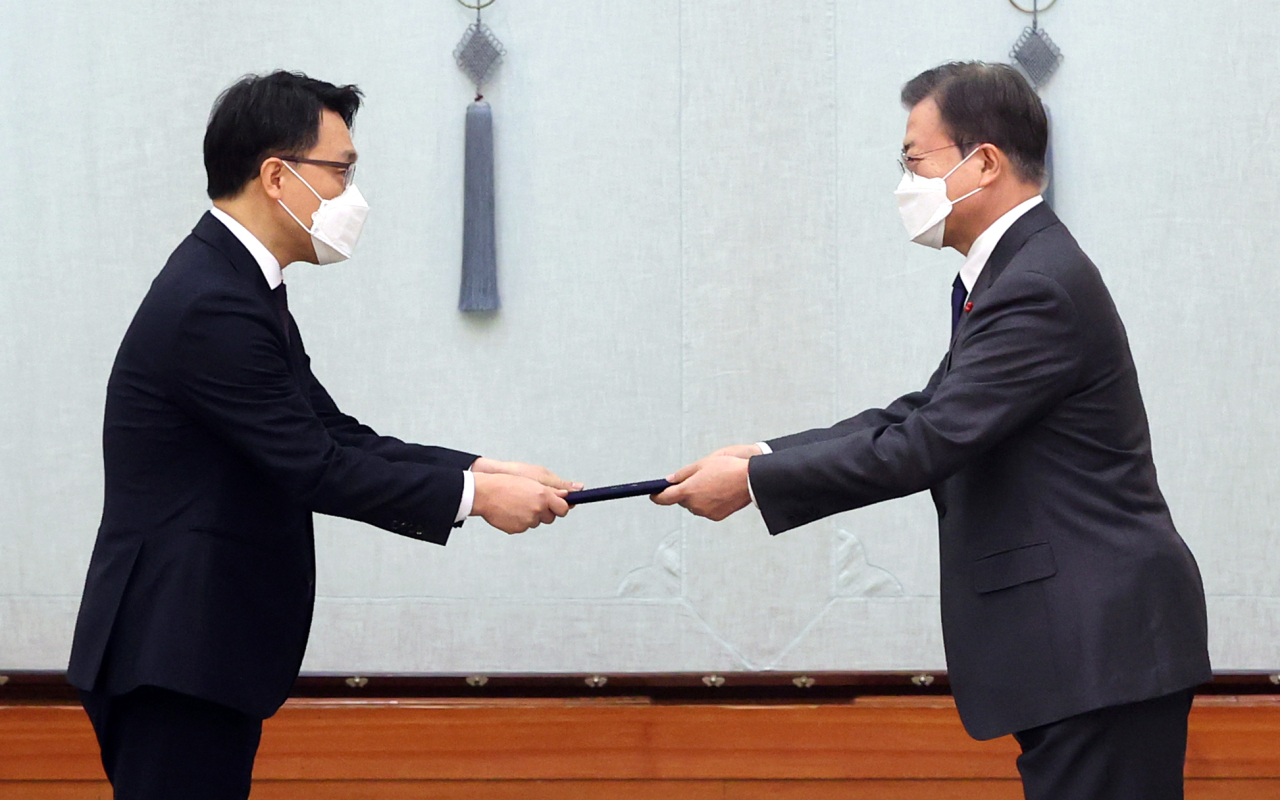A powerful new anti-corruption watchdog has officially kicked off, with President Moon Jae-in swearing in Kim Jin-wook, a former judge, as the inaugural chief of the agency Thursday.
Kim immediately started his three-year term with the Corruption Investigation Office for High-ranking Officials, which is tasked with handling corruption cases involving ranking government officials, including senior prosecutors and police officers.
“You should have pride and responsibility to lead the nation into a more transparent and corruption-free society,” Moon told Kim during the appointment ceremony at Cheong Wa Dae, expressing his gratitude for accepting the “tough job.”
“Because this is a starting point, it is important to gain trust from the public step-by-step,” he added.
The new organization, the president’s pet project and part of his prosecution reform push, also has symbolic meaning, as it has the power to indict suspects, something that had been monopolized by the prosecution for more than 70 years.
The idea of setting up an independent body to investigate corruption started in the late 1990s, when civic groups and liberal political parties called for a new institution to check the excessive power of politically influenced prosecutors. But little progress was made due to conflicting interests among rival parties.
After several failed attempts by his liberal predecessors, Moon made the issue one of his key pledges during his election campaign.
In his inauguration speech in 2017, Moon said, “I’ll make sure that all power organizations remain politically neutral and independent. A new check system will be established to prevent them from wielding excessive power.”
After drawn-out political disputes, legislation was passed in the National Assembly in December 2019 authorizing the establishment of the new body. But it took another year for the body to make its official launch as parties clashed over the inaugural leadership.
The ruling bloc said a former judge should take the helm to ensure the agency’s complete independence, while the opposition bloc insisted that a former prosecutor with more field experience should lead the organization, which consists of prosecutors and investigators.
Moon’s final pick was Kim, 54, who started his career as a judge at the Seoul Central District Court in 1995. After three years, he joined the nation’s largest law firm, Kim & Chang, where he worked as a lawyer until 2010. Then he moved to the Constitutional Court, where he was a senior researcher.
“The establishment of the CIO is a historic event that brings a shift to the judicial system, which has been dominated by the prosecution with the sole authority to investigate and indict in criminal cases,” Kim said during his opening remarks at a parliamentary hearing Wednesday.
“I’ll do my best to make the CIO a prime investigative unit backed by the people’s trust.”
Kim, a vice minister-level official, is expected to promptly organize his new team, which is to consist of a deputy chief and dozens of other prosecutors and investigators as well as administrative officials. The process could take some two months, he said.
Still, the hardest part of the post seems to be maintaining political neutrality, with speculation already growing about the agency’s first case.
During the hearing, Kim flatly denied the ruling Democratic Party of Korea was pressing him to investigate Prosecutor General Yoon Seok-youl after his recent tug-of-war with the president. Yoon was alleged to have engaged in the illegal surveillance of judges, and members of his family have been implicated in corruption.
“The first investigative case for the CIO will be symbolically important, which means that we will be open to all possibilities and will carefully review every detail with a focus on the truth,” he said.
By Lee Ji-yoon (
jylee@heraldcorp.com)








![[Today’s K-pop] Blackpink’s Jennie, Lisa invited to Coachella as solo acts](http://res.heraldm.com/phpwas/restmb_idxmake.php?idx=644&simg=/content/image/2024/11/21/20241121050099_0.jpg)